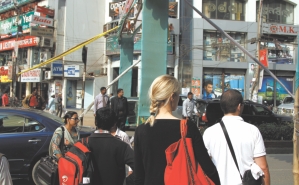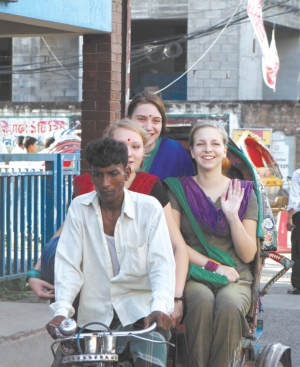| Home - Back Issues - The Team - Contact Us |
 |
| Volume 11 |Issue 03| January 20, 2012 | |
|
|
Perceptions Bideshis in B'desh Soraya Auer
"Dhaka is a real change from where we used to live, in Rome,” admits Victor Burgeon, who moved with his family to Bangladesh's capital last September. “It was difficult but I'm actually starting to like it now.” Victor, the son of a Belgian expat, is studying at an international school with his brother Clément and is not alone in feeling this way about moving countries. Having lived most of my own life as an expat, I am familiar with the adjustment to a new place, new language and new cultural norm. It's not as unusual a lifestyle as it once was and there is now a unique community of international citizens in almost every capital city. Two years ago, Jessica Mudditt arrived in Bangladesh for a six-month internship and the intention to return to the UK where she had trained as a journalist. “Compared to what I would be doing in a local paper in England, assuming I could get a job, I don't think I could've met or interviewed Christy Turlington, Sonia Gandhi, the British High Commissioner or Brett Lee, the Australian cricketer. There are just so many unwritten stories here that I could never run out, so that's very satisfying.” But that's not the only reason the Australian has stayed. “I ended up marrying my Bangladeshi translator,” admits Jessica, who works for The Independent, with a giggle. “If we leave, we'll definitely come back. We want to travel but there'll always be a connection.” Rachael Crook was studying at UCLA when she heard about BRAC from a friend. She completed a summer internship in 2009 and has been on the lookout for opportunities that would bring her back to the country. “I was there to learn and I probably got more out of it than I'll ever be able to give back,” says the British national. “It changed my life. It is inconceivable to me that I will not focus at least part of my career on international development thanks to my experience there.” Despite the short time she spent in the capital and surrounding areas, Rachael says “At a wedding I attended I saw the most extravagant display of wealth I've ever seen in my life. There's just so much the rich can do for the country but either they don't want to or don't realise they can.” She adds, “While working outside Dhaka with a Bangladeshi colleague, I was seen as an outsider and poor people would ask me for money, not her. I was 20 or 21 years old; I had no money at all. There was nothing I could do in that situation but they felt because I was white, I could help them.” Jessica expresses the same anguish when asked for money. “The disparity of wealth breaks my heart constantly,” she says. “There are so many really rich Bangladeshis and some people have nothing. The poor assume you're rich because of the colour of your skin, and I find that very sad.”
The poor are not the only ones who think bideshis (foreigners) are wealthy. “Last year, there was a time when criminals were specifically targeting expats here in Gulshan,” says Michael Page, who works for UNDP. “That was a frightening time. A couple were nearly murdered and one German woman held onto her bag and was dragged down the street.” The gang were arrested a couple of months ago but the paranoia it created, Michael believes, remains. The British national says, “The basic safety rules for London or New York also apply here. You're vulnerable wherever you are. I've otherwise found Bangladesh a very friendly place to live and work.” “One of the positive aspects of being in Bangladesh is that the expat community is quite close together,” says Wojciech Koprowicz, an Australian originally from Poland who works for UNDP. “You can't expect to see exactly the same as you would see back home but there are the international clubs where you meet and socialise with people as you would want to elsewhere.” Gulshan, an affluent neighbourhood in Dhaka, is host to many embassies and nine international clubs. These include the American Recreational Association, the Nordic Club and the International Club, which are exclusive to foreigners and their guests. Jessica Mudditt, says, “It very much can be a bubble life. I didn't join for a long time out of principle and because it wasn't practical for me at the time. But I do like having somewhere where I can buy a drink that isn't as expensive as in the 5 star hotels.” “Working for the UN can be very intense and demanding of your time so it's nice that there's quite a good social network through all the expatriate clubs,” explains Michael Page. “But there are internationals that aren't particularly successful here. They tend to create European or western bubbles and live their entire lives from expat club to expat club to each others' houses. It makes you wonder on earth they came here if they're going to have that attitude.” It is, however, not only these foreign members who contribute to the potential superiority complex, but the management and policies of these exclusive clubs. “I do find it sort of colonial and strange that you socialise by nationality,” Jessica says. “I was at the Nordic Club where people are allowed to drink, but they wouldn't serve my Bangladeshi friends and I found that offensive. We had to order on their behalf which is just nonsense.” So what is Bangladesh's appeal? Michael explains, “In most of my other UN postings, I wasn't allowed to bring my family with me. Bangladesh is one country where it's allowed because it's safe enough.” Wojciech's family lived in Dhaka with him for two years until his daughter graduated and went to university in Australia. The ICT specialist, who goes back to visit his family every few months, says, “It is obviously hard in a situation where you're separated for long periods of time from your family. But if another opportunity were to come up in Bangladesh, I'd be happy to stay. When I worked in West Africa, I couldn't even bring my family to visit me so in that respect, Bangladesh is a great place.” There are also foreigners in Bangladesh not in the development industry. International businesses and businessmen have invested in other industries such as the garment and electronic industries. Tony Yin has been manufacturing plastic since 2008 and exports back to his home country of China. “I have found Bangladeshis to be smart in business and generally friendly. Working here is not as good for business as it once was, but I have plans to stay here maybe another five years.” “I've always had a very positive experience here,” says Wojciech. “There are quite a few nice spots to visit in the country like the tea gardens and Sundarbans. Though, I'd say we've got nicer beaches in Australia!” “Dhaka is a tough city,” thinks Jessica. “But I know expats who were sad to leave, so I think you eventually fall in love with it and the warmth of the people.” Not all bad then. New and future expats, like Victor, will hopefully join the many that have lived in Bangladesh and found by the end of their time here, they have more than liked it, they have loved it.
Copyright
(R) thedailystar.net 2012 |

